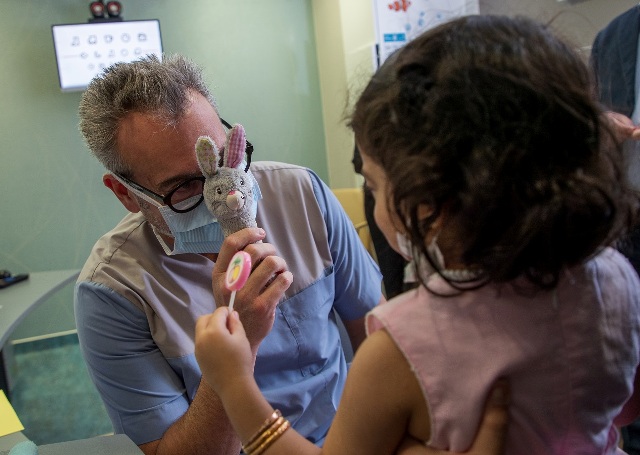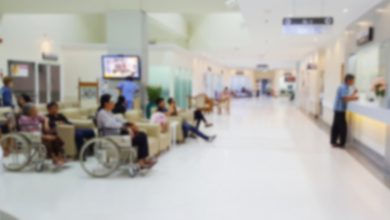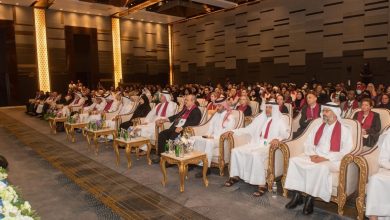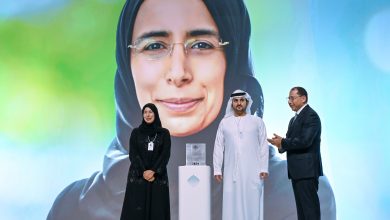
Sidra produces eye drops to treat ultra-rare disease
سدرة للطب يعالج عيون طفلة قطرية من مرض نادر
Doha: A multidisciplinary team effort at Sidra Medicine, a member of Qatar Foundation, has produced country’s first plasma eye drops and treated a 10-month old Qatari child with “one-in-a-million” condition.
In early 2020, the family of the child suffering from an ultra-rare disease called plasminogen deficiency, that was causing the child’s eyes to fill with woody growths, got in touch with Sidra Medicine. The family, then in the UK, was desperate to return to Qatar given the rising number of COVID-19 cases in the UK, but were afraid that their daughter would not receive the right treatment back home.
However, doctors at Sidra Medicine, the only hospital in Qatar that offers precision medicine to paediatric patients, were positive that it could offer treatment for this condition. Dr. Chiara Cugno, Director of the Advanced Cell Therapy Core at Sidra Medicine, said: “When we were contacted about this case, we were confident right from the beginning that we had the expertise available to do this.
“The only thing was that the treatment – plasma eye drops – had never been produced in Qatar before, not just at Sidra Medicine, but anywhere else in the country. So, we understood that regulatory approvals would take a while, but since we already had a strong foundation to develop the eye drops in-house, we pooled in all our expertise to help this young patient.”
The child’s mother said: “There was a time my daughter couldn’t open her eyes; I was terrified she was going to lose her eyesight.”
The prevalence of plasminogen deficiency is estimated at 1.6 per one million people. A personalised approach, using eye drops, is the only option currently available for managing this rare disease, which is also classed as an orphan disease – a disease with no cure. To manage it, the patient must use eye drops containing plasmin – the enzyme that the patient is lacking.
The eye drops are made using the plasma of a donor who is a match for the patient. “The woody growths caused by plasminogen deficiency can be surgically removed, but to stop them from growing back, the patient needs special eye drops made from human plasma or serum containing plasminogen,” said Dr. Pedro Mattar, Senior Attending Physician, Ophthalmology Division at Sidra Medicine.
While the family did initially import the eye drops from the UK, the team at Sidra Medicine was adamant at producing these eye drops locally. Because the eye drops are not a one-time treatment and need to be administered every few hours, the family would continue needing them in the future, and if they aren’t available locally, the family would either have to travel to the UK every three months or import them. Dr. Cugno said: “Neither of these choices is sustainable or economical. There was no choice but for us to do it here in Qatar.”
The team working on producing the eye drops consisted of members from various departments across Sidra Medicine including Pediatric Hematology, Ophthalmology, Pathology Blood Bank and Advanced Cell Therapy Core. To speed up the process, instead of locating a donor and then screening them to ensure they are healthy, the team decided to use existing fresh frozen plasma from screened donors that is usually used for infusion.
“Turning the donated blood plasma into eyedrops not only required a great deal of planning but also careful and extensive review of available literature to guarantee that Sidra Medicine followed the highest global quality assurance protocols,” said Dr. Eileen McBride, Medical Director of the Transfusion Medicine laboratory at Sidra Medicine. “Because this was the first time something like this was being done, we found ourselves looking for an automated sterile production system which could fill several eye drop vials to be given to the family for use over three months. Due to the pandemic, each step of the process was delayed, but thanks to the determination of all the teams, we eventually succeeded,” said Massimino Jan Miele, Manager of Advanced Cell Therapy Core Laboratories at Sidra Medicine.
The child’s mother said she often worried if the doctors and researchers at Sidra Medicine would be able to channel enough of their time and commitment towards her daughters’ case, given she was the only one in the entire country with this disease.
“It seemed like maybe the effort was too much to put in into one patient. Yet they still did it, and with so much zeal. Despite the pandemic my daughter’s case was never put on the back burner and remained a top priority,” she said.
In May 2021, the family received the locally produced eye drops for their child. Dr. Ayman Saleh, Chief of Pediatric Oncology and Hematology at Sidra Medicine said: “This was a truly joint effort, not just between the different teams at Sidra Medicine but also the family. We are grateful to the parents for trusting us and allowing us the opportunity to produce these eye drops. This project was not only a first for Sidra Medicine, but also a first for Qatar.”
الدوحة: تواصلت أسرة رضيعة قطرية لا يتجاوز عمرها 10 أشهر مع مركز سدرة للطب، لعلاجها من مرض غاية في الندرة، يسمى نقص إنزيم البلازمينوجين، الذي يفضي إلى حدوث التهابات خشبية الشكل في ملتحمة العين. كانت الأسرة حينها تقطن في المملكة المتحدة وتتحرق شوقاً إلى العودة إلى قطر في ظل الارتفاع الكبير في أعداد المصابين بكوفيد – 19 في المملكة المتحدة، ولكنها كانت تخشى في الوقت ذاته ألا تتلقى ابنتهم العلاج المناسب في أرض الوطن.
وعلقت د. كيارا كوجنو، مدير مركز العلاج الخلوي المتقدم في سدرة للطب على الحالة، قائلة: “عندما أُبلغنا بهذه الحالة، كنا على ثقة تامة ومنذ اللحظة الأولى بأننا نتمتع بالخبرة اللازمة للتعامل مع هذه الحالة، فالعلاج الوحيد المتاح لهذا المرض هو قطرات بلازما العين، والتي لم يسبق إنتاجها في مركز السدرة من قبل ولا في أيّ مكان آخر في دولة قطر. ولعلمنا أن المستشفى يتمتع بالمرافق الطبية التي تكفل له إنتاج قطرات العين بشكل داخلي.
معاناة شديدة من المرض
قالت والدة الطفلة: “مرت أوقات لم تستطع طفلتي أن تفتح عينيها؛ وقد تملّكني الرعب من احتمالية فقدان بصرها”.
يقدّر معدل الإصابة بنقص البلازمينوجين بحالة واحدة لكل 1.6 مليون فرد. ولا يوجد سوى سبيل واحد للتعامل مع هذا المرض النادر، ألا وهو الطب الشخصي الذي يتم فيه استخدام قطرات العين. وتجدر الإشارة إلى أن هذا المرض هو أحد الأمراض النادرة التي لا يتوفر لها علاج ناجع حتى الآن. لذلك، فإن التعامل مع هذا المرض يقتضي إعطاء المريض قطرات للعين تحتوي على إنزيم البلازمين الذي يعاني المريض من نقصه. وتصنع قطرات العين باستخدام بلازما مستخلصة من متبرع متوافق مع المريض.
إنتاج القطرات في الدوحة
ورغم أن أسرة الطفلة لجأت إلى استيراد قطرات العين من المملكة المتحدة في بادئ الأمر، إلا أن فريق العمل في سدرة للطب كان حريصا على إنتاج هذه القطرات محليا لأنه يتعين استخدامها كل بضع ساعات، الأمر الذي قد يشق على أسرة الطفلة إذ ستكون في حاجة مستمرة إليها في المستقبل، ولو لم يتوفر بديل محلي لها سيتعين عليها إما استيرادها كل ثلاثة شهور.
تقول والدة الطفلة: “كان يبدو كمّ المجهودات المبذولة هائلًا ليتم تكريسه لحالة مرضية واحدة، ومع ذلك خصص الأطباء لها كل الوقت بل وبحماسة والتزام منقطع النظير. وعلى الرغم من ظروف الجائحة، تم التعامل مع حالة طفلتي كأولوية طوال الوقت”، مضيفة أنه وبعد أن أصبحت سدرة للطب تُنتج قطرات العين، تم إعفاؤنا من هذه المسؤولية الشّاقة.



